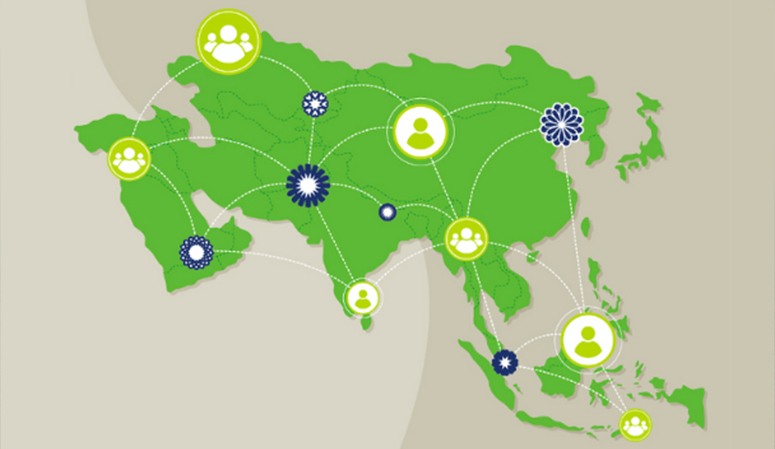Housed at a world-class university with Los Angeles' rich cultural diversity at our fingertips, the USC Center on Public Diplomacy (CPD) is the leading academic center dedicated to the study and practice of public diplomacy...
KEEP READING
Catch Up on 2021 Discussions in Public Diplomacy
Curious about this year's discussions in public diplomacy at CPD? Catch up with our event video recordings of experts who address critical perspectives of U.S. government, why innovation matters in PD and much more.
View all past events here.
Information Capability and Defense
Although the U.S. Department of Defense has encouraged the armed forces to expand information operations capabilities, the military culture continues to look at the information domain as a sphere to influence only during hostilities. U.S. Army Lt. Col. Gregory M. Tomlin joined CPD to discuss his proposal of an expansion of the military definition of “engagement” that currently is restricted to striking targets with lethal force. He asks us to conceptualize a new methodology—the Global Engagement Cycle—to identify audiences, develop messages and select the best information-related capabilities to influence audiences during peacetime.
This discussion was moderated by Marie Royce, CPD Advisory Board Member and former Assistant Secretary of State, Educational and Cultural Affairs (ECA) (2018–2021).
Learn more here.
International Views of U.S. Policies, Culture and Politics in the Biden Era
How has America’s international image changed since U.S. President Joe Biden took office? And what do people in other nations think about American culture and society and the current state of U.S. politics? Pew Research Center's Director of Global Attitudes Research Richard Wike joined CPD Director Jay Wang to discuss the key findings from a Pew study that surveyed 17 international publics and found complexities in America’s international image.
Access Pew’s report, “What People Around the World Like – and Dislike – About American Society and Politics,” here.
To learn more click here.
Innovation Matters to PD
This year CPD in collaboration with the U.S. Department of State launched the annual Public Diplomacy Innovation Prize to recognize programs and practices that create innovative and scalable solutions to vital challenges in contemporary public diplomacy. In addition to a cash prize, the recipients participate in a week-long residency at the University of Southern California, where they engage with students, scholars and members of the broader community in the global city of Los Angeles.
The Public Diplomacy Innovation Prize is designed to promote public diplomacy as a critical tool for foreign policy and international relations within the U.S. Department of State and beyond. In recognizing emerging leaders in this space, CPD also hopes to inspire newer entrants to the foreign service to develop and implement cutting-edge strategies and practices to promote U.S. interests abroad and improve global cooperation.
This discussion was moderated by CPD Advisory Board Members Goli Ameri and Colleen Bell, CPD Advisory Board Chair Barry A. Sanders and CPD Director Jay Wang.
To learn more click here.
A Conversation with Wendy Sherman, U.S. Deputy Secretary of State
The nation’s number-two diplomat Wendy Sherman, U.S. Deputy Secretary of State, joined CPD for a timely conversation with USC Annenberg Dean Willow Bay on the Biden-Harris administration’s Indo-Pacific strategy writ large.
Their conversation touched on various topics including the public diplomacy implications of U.S. military withdrawal from Afghanistan, the U.S.’ multifaceted relationship with China, strategies for connecting foreign policy to domestic audiences, and Deputy Secretary Sherman’s negotiation skills and experience under three presidents and across major negotiations such as with North Korea, Iran and China.
Introductory remarks were provided by CPD Advisory Board Chair Barry A. Sanders and CPD Director Jay Wang.
Learn more here.
Public Diplomacy in Asia 2021
CPD and the Singapore International Foundation hosted the Public Diplomacy in Asia virtual conference July 26–30 with over 1,500 public diplomacy practitioners, scholars and other representatives from the private and public sectors who discussed the evolution of PD policy and practice across Asia, a burgeoning region in PD. As the first major conference on public diplomacy in Southeast Asia, topics included new strategies for global engagement, bridging the worlds of business and diplomacy, measuring and evaluating PD effectiveness, cultural diplomacy, city diplomacy, digital diplomacy and more.
Featured CPD experts included Corneliu Bjola, Oxford University Associate Professor and CPD Faculty Fellow; Caitlin Byrne, Director of the Griffith Asia Institute and CPD Faculty Fellow; Nicholas J. Cull, USC Annenberg Professor and CPD Faculty Fellow; CPD Director Jay Wang; and Jonathan Woetzel, McKinsey Global Institute Director and CPD Advisory Board Member.
Watch videos here. Please note, website registration is free and required to access videos.
Learn more here.
Does Public Diplomacy Sway Public Opinion?
CPD presented new, much-needed research demonstrating that head-of-state visits can increase public approval among foreign citizens. Researchers Benjamin Goldsmith of Australian National University, Yusaku Horiuchi of Dartmouth University and Kelly Matush of Florida State University analyzed the international travels of 15 leaders from 9 countries over 11 years, via surveys from 38 host countries representing over 30,000 individual respondents. Their findings are published in American Political Science Review here and suggest that PD has the potential to shape global affairs through soft power.
To learn more click here.
Holding Government Accountable on National Security
Our increasingly globalized world demands more from governments and the decisions they make. In his book Leap of Faith: Hubris, Negligence, and America’s Greatest Foreign Policy Tragedy, author Michael Mazarr, RAND Corporation Senior Political Scientist, catalogues over a decade of research into the decision to go to war in Iraq. Mazarr’s poignant discussion with CPD highlighted his suggestion that senior leadership and national security officials adopt a “doctrine of policy negligence” for choices of war and peace, a process that would require senior officials to meet certain criteria for the quality and rigor of their decision process.
This discussion was moderated by CPD Faculty Fellow and Director of the Griffith Asia Institute Caitlin Byrne.
To learn more click here.
Visit CPD's Online Library
Explore CPD's vast online database featuring the latest books, articles, speeches and information on international organizations dedicated to public diplomacy.
Popular Blogs
-
March 22
-
April 1
-
April 11
-
March 4
-
March 19












